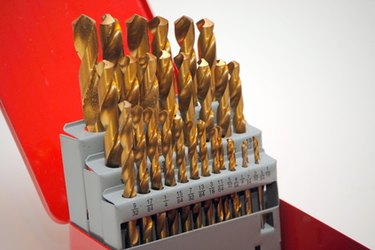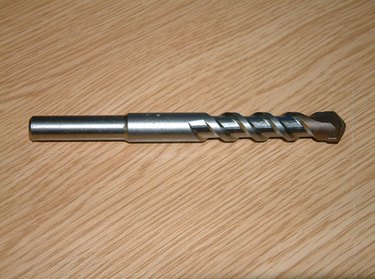
Most drill bits for drilling wood, metal or masonry incorporate some type of flute in the design. The flute is a deep groove that typically twists around the bit, giving the waste material a path out of the hole. Flutes can vary in size, shape and the number of flutes on the bit. Without a flute, the bit would not cut as quickly, as the waste material would need to be removed before drilling could continue.
Twist Bits
Video of the Day

Twist bits are the most commonly-used type of drill bit. Twist bits typically are sold in a variety of sizes, often in sets. Most twist bits have either two matching flutes that twist up the shaft, one on either side of the shaft. Traditional twist bits can be used to cut wood, plastic and metal.
Video of the Day
Masonry Bits

Masonry bits are a variation on the twist bit. A masonry bit typically has two or three flutes, but the cutting tip acts a lot like a chisel. This tip creates a fine dust that is carried out of the hole by the flutes.
Spur-Point Bits

A spur-point bit is quite similar to a twist bit, but it has a very sharp point and two aggressive cutting edges at the tip. The flutes also are deeper than those of most twist bits, allowing for faster cutting. Spur-point bits should be used only for cutting into wood or soft plastics.
Forstner bit.

Forstner bits are built for cutting clean, flat-bottomed holes of larger diameters than twist bits allow. Forstner bits are commonly used in cabinetry for drilling the recesses for English-style cabinet hinges. A Forstner bit typically has a very short flute, with the cutter acting more like a plane iron than like a drill bit.
Spade Bits

Spade bits, sometimes referred to as paddle bits, have no need for flutes because there is more open area in the hole being drilled than the space taken up by the drill bit. This leaves plenty of room for the waste material to escape. Spade bits are designed for cutting into wood or soft plastic only.
Auger Bits
Auger bits have perhaps the most aggressive flutes of any wood bits. Auger bits are designed for slow drilling into wood and traditionally were built for use with a brace, a hand-operated drill. Auger bits are perfect for drilling deep holes between 3/4-inch and 2 inches in diameter.